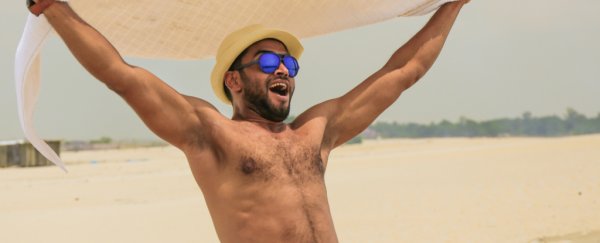It's a question that's been bothering humans for centuries, even before the theory of evolution was first conceived. Why do men and other male mammals have nipples if they don't feed their young? What's the point?
"I have received more than a dozen requests to explain how evolution could possibly produce such a useless structure," evolutionary biologist Stephen Jay Gould wrote in a journal column back in 1993.
After all, the vast majority of men never lactate, although there are a few exceptions which typically involve some hormonal problem. But when we think about traits from an evolutionary perspective, we often think in terms of 'What is this thing good for?'
It turns out that the case of male nipples somewhat contradicts that very question.
The short answer is that it's not necessarily a feature produced by evolution - instead, it's more like a feature that evolution didn't bother to get rid of, or possibly even couldn't.
"In my view of life … male nipples are an expectation based on pathways of sexual differentiation in mammalian embryology," wrote Gould.
What he was referring to is the fact that all mammal embryos - male and female - start out looking exactly the same, with potential to develop into either sex.
But if the embryo has an XY chromosome set, after the first few weeks a gene called SRY kicks in, triggering the genetic switch that sends the embryo down the male development path.
But here's the thing - mammary glands start developing super-early, even before SRY can do its job. And so the precursors to breast tissue, nipples and all, are preserved even once an embryo becomes biologically male.
And it's not like having nipples is a costly feature to have. So even if evolution could rewire the developmental process to get rid of them for men, it's more likely that it just shrugged and let them be.
It's also a reminder that evolution is kinda messy. According to evolutionary biologist Rob Brooks from the University of New South Wales in Australia, several genes can be involved in the making of a trait, leaving it around even if it's not being selected for.
"Even for periods of time, something can be selected neither for nor against, and what you would expect under those circumstances is that the presence or absence of our traits will drift," Brooks told ScienceAlert.
So the answer seems pretty simple in the end. But exploring the question about male nipples also gives us a nice lesson about adaptive thinking in evolution.
People sometimes get carried away and try to find an evolutionary explanation for every trait they see. After all, when you understand the basic premise of evolution, it becomes a pretty compelling narrative.
"It's really tempting to [view traits as adaptive] because once you understand the adaptive logic, then you start - like with all confirmation bias - to see the signature of adaptation everywhere," says Brooks.
But just because a story is compelling, doesn't mean it's accurate. Sure, you could come up with some elaborate story on how male nipples must be attractive for females somehow, but it's much more plausible to consider the simple developmental wiring problem we explained above.
Gould himself was famously critical of "just-so stories" about natural selection, but bear in mind that they can be an excellent starting point for further experiments.
"Science is there to test the ideas, so adaptive storytelling is hugely important, because it's the source of our hypotheses," Brooks told ScienceAlert.
"If you don't come up with an adaptive story, then there's nothing to test."
Of course, in the case of male nipples, we don't need an adaptive story. Just treat them as accessories, guys.
